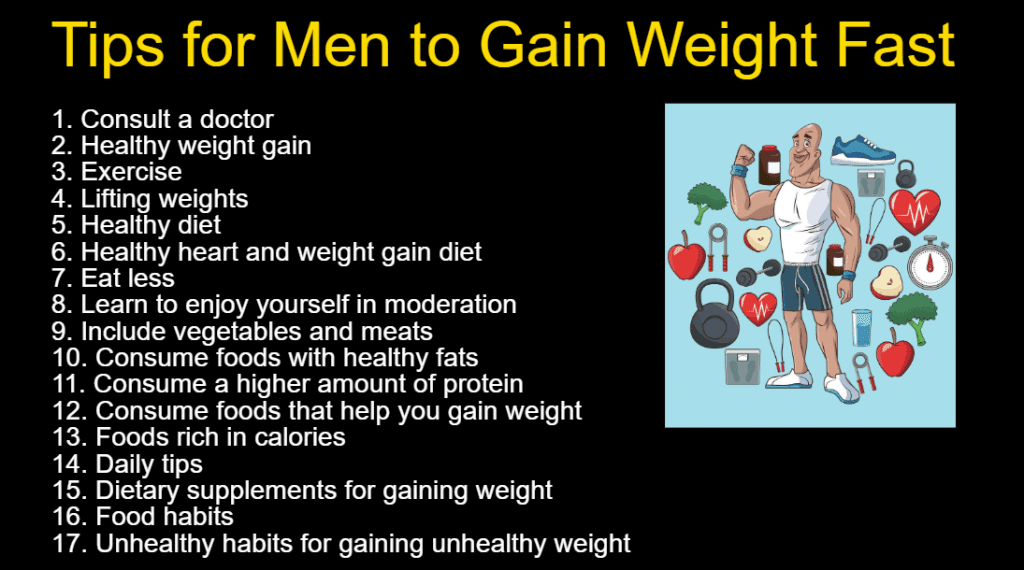Last updated on March 26th, 2024 at 01:00 am
Whether underweight or just sick of being the thin guy at the gym, the best nutrition tactics to gain a healthy weight remain the same: you need to consume enough food and the proper kinds of food to gain weight. Putting on weight is not always a complicated process, even though it may seem complex or difficult to do for some people.
Ignore the science and make your health objectives more manageable by concentrating your efforts on the behaviors most likely to shift the needle. The following is a brief and comprehensive article that will teach you how to put on weight as quickly as possible.
Table of Contents
Why is gaining weight necessary?
Many individuals suffer from the opposite issue of being underweight, even though around 74 percent of adults in the United States are overweight or obese. Because of their genes or their metabolism, some people have a lower-than-average body mass index (BMI). You may also reflect underlying health issues or inadequate nutrition in a person’s low weight.
In addition, many individuals who are not clinically underweight but would nonetheless want to put on some muscle and weight for various reasons may be interested in gaining weight. The fundamentals remain the same whether you are clinically underweight or struggle to acquire muscle weight; the goal is to increase your total body mass.
What does it mean to be ‘underweight’?

To be considered underweight, a person must have a body mass index (BMI) of less than 18.5. According to some estimates, this is lower than the body mass required to maintain optimum health. However, bear in mind that the body mass index (BMI) scale, which solely considers a person’s height and weight, has a lot of flaws. It does not take into consideration the amount of muscle mass.
Some persons are naturally skinny but are otherwise healthy. According to this scale, low weight does not automatically indicate anything wrong with your health. The Centers for Disease Control and Prevention (CDC) reports that women have around double the prevalence of being underweight compared to males.
A poll in the United States divided respondents into men and women and found that 1.3% of males and 2% of women over 20 are underweight.
The Reason Why You’re Underweight or Not Gaining Weight?
You’ve been doing weightlifting and consuming a significant quantity of protein, but you’re not seeing any progress—what gives? The bare facts are that you aren’t getting enough food into your system.
Consuming more calories than you burn off each day is the name of the game when it comes to both gaining and losing weight. It doesn’t matter what you eat or how often you lift weights if you aren’t consuming enough calories to put on weight. It will not happen for you, no matter how hard you try.
Individual health characteristics, in addition to the laws of physics, may sometimes be a determining factor. For some people, gaining weight may be a challenging uphill fight brought on by drugs, health issues, or even their genetic inclination, requiring commitment throughout the process.
This skill’s primary focus is learning to eat even when you are not hungry and continuing to eat until you are so complete that it is uncomfortable. No matter what, the first step is always the same: increase the amount of food you consume.
Causes of being Underweight:
Men may be underweight for various causes, including those deeper below the surface. The following are some of the reasons:
- There is a pattern of being skinny in the family’s medical history.
- If you have a fast metabolism, you won’t be able to put on weight no matter how many high-energy meals you consume.
- People who participate in strenuous activities such as sports, runners, and others may have a lower body weight since they burn a substantial number of calories during these activities.
- A person’s appetite can drop due to specific chronic health issues such as thyroid disorders, cancer, diabetes, or digestive ailments, which may lead to a lower weight in males.
- A person’s state of mind may affect their appetite, which can lead to a reduction in weight for many of them.
What are the Best Tips for Men to Gain Weight Fast?:

If you are interested in healthily gaining weight, the advice and suggestions that follow are some things you should bear in mind.
1. Consult a doctor
Before beginning anything new, it is essential to have a good awareness of your body, as was just discussed. The first thing that needs to be done is to get to the bottom of the issue. You must have an understanding of the reasons why your body is unable to put on weight. To get to the bottom of the case, you should discuss it with your nutritionist and primary care physician.
2. Healthy weight gain:
People frequently tell those skinny people to eat everything since, as the saying goes, “nothing gets utilized in our body.” This way of thinking has to change. A permanent and healthy weight increase occurs over time.
If you increase the number of calories you consume each day by 500 kcal, you may cause your body to gain half a kilogram per week. On the other hand, this entirely relies on how your body reacts to the different things you eat and your gender, current body weight, and height.
3. Exercise:
The assumption that a slim person’s body would not be affected by the food they eat is the worst error they can make. Even the leanest of bodies have the propensity to develop an ugly paunch. Thus you must avoid this stage at all costs. It is because having an abdomen indicates that both the visceral and subcutaneous fat in your body is expanding, which is not a good indication and demonstrates that you are not healthy.
In addition, it is a symptom that your muscles are progressively becoming weaker, which might be a severe health risk. As a result, it is essential to include several forms of physical activity into one’s daily routine, including cardio, strength training, and activities that improve flexibility.
4. Lifting weights
Put another way; this refers to your body’s weight that isn’t stored as fat. Therefore, the end goal is to get a higher percentage of lean body mass. To do this, you will have to engage in vigorous weight lifting.
Squats, deadlifts, presses, pull-ups, rows, dips, snatches, cleans, and jerks are some exercises you should include here. These exercises will assist you in activating various muscle groups while stimulating your hormone response systems.
5. Healthy diet:
Many dietary supplement products are available on the market, promising rapid weight gain. However, it is essential to remember that most of these nutritional supplements are loaded with artificial nutrients, which may cause you to gain weight momentarily but will have a long-term negative impact on your health.
Therefore, you should speak with your nutritionist or primary care physician before taking anything. Second, you won’t benefit from using these dietary supplements until you get your diet under control.
Your body needs a specific ratio of proteins, lipids, and carbohydrates to function correctly. Maintaining a balanced diet that excludes alcoholic beverages and includes foods such as nuts and dairy products can help you achieve your goals more quickly.
6. Healthy heart and weight gain diet:
When we want to put on weight, most of us make the critical error of consuming meals that might be detrimental to our health. Consuming empty calories full of bad fats would deplete our health, but our bodies need good fats to function correctly.
As a result, you should include nutritious snacks in your diet. Because of this, consuming foods such as nuts, dried fruits, fruits, and dry snacks like roasted chana will tremendously assist in putting on healthy weight.
In addition, you can also consume foods such as multigrain bread, soy sticks, hummus, and peanut butter (all of which are rich in protein). Selecting meals high in fiber is also advantageous for your health. The single most crucial thing to keep in mind is that the size of your appetite should progressively expand as time goes on.
7. Eat less:
Massively consuming food that can cause one to gain weight is another widespread misconception that must be debunked as soon as possible. It is naive to believe that your body will be unaffected by consuming large amounts of junk food while simultaneously assuming that you will.
Cutting your meals up into smaller portions can help you avoid reaching for unhealthy snacks in between meals, which is the most fantastic strategy for putting on weight. Consuming meals that are high in nutrients in addition to calories is a preferable alternative to consuming foods that are filled with calories that are not healthy. If a person is slender yet engages in poor eating behaviors, they are just as likely to develop lifestyle-related illnesses as fat.
8. Learn to enjoy yourself in moderation:
As was noted previously, indulging oneself in anything should be done appropriately. Our ears will be bombarded with various viewpoints whenever we begin any fitness journey, regardless of whether we attempt to lose or gain weight.
Some believe skinny people should try to consume as many sweet foods as possible. Not only will this cause an increase in visceral fat, which is the fat that surrounds your organs, but it will also cause a reduction in the body’s ability to absorb nutrients from other meals. When a person is thin, their primary worry is that they may gain weight in undesirable places.
9. Include vegetables and meats:
Proteins, minerals, and fiber may all be found in a plentiful supply of vegetables and meats. These are necessary for someone who is trying to put on weight. Vegetables and lean meats, which assist in suppressing hunger sensations, should be included in your diet to maximize the benefits of avoiding unhealthy snacks.
For the hormones in our body to be synthesized, we need to provide them with an adequate amount of protein.
10. Consume foods with healthy fats:
Consuming egg yolks, meats with animal fats, coconut oil, and other healthy fats, together with other healthy fats, is the most effective approach to including healthy fats in your diet. Incorporating fruits like bananas and sapodilla into your diet will also be beneficial. However, moderation in eating these things is strongly encouraged.
11. Consume a higher amount of protein:
Consuming one gram of protein per kilogram of body weight is the recommended amount for everyone, regardless of whether they are overweight. It is the fundamental prerequisite and is expected to be met daily. It will not only stop the unwanted hunger sensations that lead to you bingeing on unhealthy foods, but it will also assist you in keeping a healthy body weight while increasing your lean body mass.
If you deprive your body of proteins, it will never be able to function at its optimal level of health since proteins are the fundamental components of our cells and tissues. It will be easier to meet your daily protein requirements if you include foods like tofu, paneer, poultry, and greens like spinach.
12. Consume foods that help you gain weight:
Some meals are found in their natural state, which can cause healthy weight growth. It is essential to consume meals with high levels of good fats. You might have seafood such as tuna and salmon, natural fruit juices, flatbreads made from whole wheat, and loaves of bread.
13. Foods rich in calories:
There are two distinct kinds of calories: empty and healthy. Both are possible to consume. The calories we get from manufactured meals and beverages are known as empty calories.
In contrast, the calories we obtain from natural foods like vegetables and fruits are known as healthy calories. Cheeses, oils, bananas, and handmade butter like peanut and almond butter are some foods that fall into this category.
14. Daily tips:
It is recommended that those looking to gain weight adhere to a few fundamentals. If you want to put on weight quickly, you shouldn’t stuff your plate with pointless items like chocolate bars and bottled juice so that you can do it.
You will be able to gain weight gradually but permanently if you consume foods that are high in calories yet nutritious, such as yogurt. Eating three to four servings of fruits and vegetables will help you reduce your craving for unhealthy foods and give you the essential nutrients you need to keep your body functioning correctly.
15. Dietary supplements for gaining weight:
Tablets, powders, and capsules are all considered to be dietary supplements. These may take the form of protein powders, bars that substitute meals, multivitamins, and so on. As noted before, consuming any of them should only be done after first speaking with your primary care physician or a dietitian.
An overdose of nutritional supplements may result in various unpleasant side effects, including nausea, vomiting, and diarrhea. It is always best to acquire guidance before purchasing certain things, even though they are necessary today.
16. Food habits:
Consuming three bad meals in addition to one nutritious meal will slow down the process for you and may also lead to potential health risks. Some fundamentals to keep in mind include: chewing your food thoroughly to facilitate digestion; avoiding drinking an excessive amount of caffeinated beverages or alcohol because doing so interferes with the body’s ability to absorb nutrients; monitoring your weight regularly; and preparing your meals using ingredients that are good for your health.
17. Unhealthy habits for gaining unhealthy weight:
As was just discussed, naturally slender persons often have false beliefs about what constitutes being ‘healthy.’ Being healthy does not equate to being overweight for already skinny persons, and vice versa.
You must eliminate certain negative habits as soon as possible, such as skipping breakfast and eating meals at inconvenient times.
18. The result:
Your ultimate goal should be to acquire weight, so your body becomes toned and curved in the appropriate locations. If you are lean and notice that you are gaining weight in your abdomen region, this may be a cause for concern.
As a result of the slower rate at which persons with a lower body mass index absorb meals, this procedure may be quite sluggish; consequently, it is essential to exercise patience. Click the image taken of you before you started working out, and then click another picture after you’ve worked out for three months.
How long will it take to gain weight?
If a person consumes an additional 500 calories each day over six months, they may gain an extra 15 pounds (6.8 kg) on average. If you take a more aggressive approach and consume an additional 1,000 calories daily, you can gain approximately 25 pounds (11.4 kg) in six months. On the other hand, most of this weight gain may be comprised of fat.
Some individuals have a callous time putting on weight, and the length of time it takes to accomplish this goal varies significantly from person to person. This may be because your body has a “setpoint” weight, the point at which it’s at its healthiest.
It is hypothesized that if you attempt to go below your setpoint (which would result in weight loss) or beyond it (which would result in weight gain), your body will fight the alterations by controlling your hunger levels and your metabolic rate.
Your body may react to eating more calories and gaining weight by making you feel less hungry and speeding up your metabolism. Your brain and chemicals that regulate your weight, like leptin, may be primarily responsible for this. Nevertheless, the researchers have not validated or disproved their idea, and more investigation is still needed. Therefore, you may face some degree of difficulty.
Related Articles:
Best Tips For Weight Gain For Babies
Conclusion:
There are many different reasons why someone would wish to put on weight. It is essential to accomplish this goal by consuming meals high in nutrients and constructing lean muscle mass. Ultimately, altering your weight is a process that is more akin to a marathon than a sprint. It may take a long time to be successful in the long term, and you must be constant throughout the process.
You must consult with a medical professional or a nutritionist if, despite attempting the measures shown above, you cannot gain weight. A dietician can assist you in developing dietary practices that will get you closer to achieving your objective.
Before you make an effort to put on weight by following the advice presented above, you should probably see a medical professional to rule out the possibility that you are suffering from a problem that has not yet been adequately identified.







